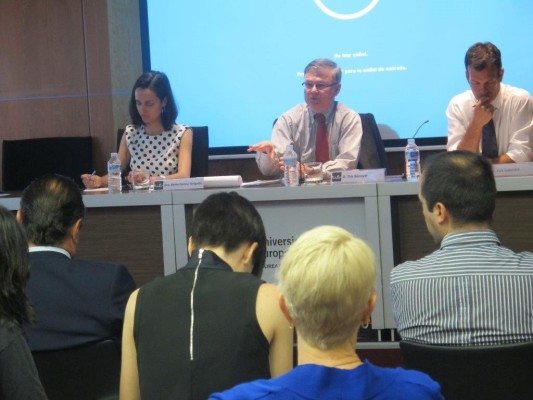On 26th of June 2014, Mr. Tim Bennett, Director General and CEO of the Transatlantic Business Council came to the Universidad Europea de Madrid to give a conference on the TTIP to international relations and communication students.
The Trans-Atlantic Business Council is a cross-sectoral business association. It represents more than 70 global companies and more than 5.6 million employees. Mr. Bennet explained that the Trans-Atlantic Business Council is the only transatlantic business organization that provides one voice for EU and U.S. companies in the Transatlantic Trade and Investment Partnership (TTIP).
Mr. Bennet began his intervention by pointing out that the TTIP is the largest economic agreement ever proposed. It is an investment partnership between the U.S.A. and the European Union. He also explained the motivations that drew both powers to start the negotiations, for instance, the economic recession that has led to a huge unemployment, the inadequate growth and the willingness to create rules for an international trade system. He argued that the WTO has become similar to the U.N. General Assembly and that loads of regional trade agreements have recently been made, therefore, the U.S. and Europe are trying to create an economically integrated space. According to Mr. Bennett, there are not many large macro-economic policy tools that governments have left; trade policy is probably the primary macroeconomic tool they can take.
The aim of this agreement is to reduce costs, to get convergence on legislations and to improve the competitiveness of the E.U. and the U.S. due to the fierce international arena. Mr. Bennet also said that in today’s world of competitiveness, with new emerging powers such as the BRICS or Russia’s expansionism, the TTIP will strengthen the geopolitical relations between the U.S. and Europe.
Mr. Bennett explained some of the challenges that arose during the negotiations such as data flows (very important for businesses), trade secrets, energy or agriculture and some of the benefits that will come with the implementation of the TTIP, for instance: the reducing costs or the improving the political relations and the competitiveness of both the U.S. and the E.U.
Regarding the secrecy of the negotiations, Mr. Bennett claimed that there’s neither secrecy nor conspiracy. He argued that information and updates on the negotiations have been published. However, he also added that negotiations need to be close-doors.
After his half an hour intervention, several members of the faculty and students asked him questions. For instance, an international relations student wondered how small and middle companies will be able to compete with big enterprises such as Google or Goldman Sachs. He responded that small and middle companies will benefit from TTIP, having access to other services, exports and imports in the regions of U.S. and E.U. only some technological companies will be in danger to be bought by a large company eg. Facebook. Another interesting point made by a student was regarding the TTP and the TTIP, if he considered there is a conflict between the two agreements. He answered by saying that the U.S. has never forgotten Europe although some people may argue that the U.S. has recently focused only on the Pacific. He added that the TTP is stuck and that it has a 50% of chance of beign implemented, unlike the TTIP, which looks quite promising.
Mr. Bennet announced that if all go as planned, the TTIP will be implemented on January 1st 2017, after being submitted to the US Congress and the European Parliament for their consideration and hopefully their approval in the months of January-April 2016.
Paula Padrino











